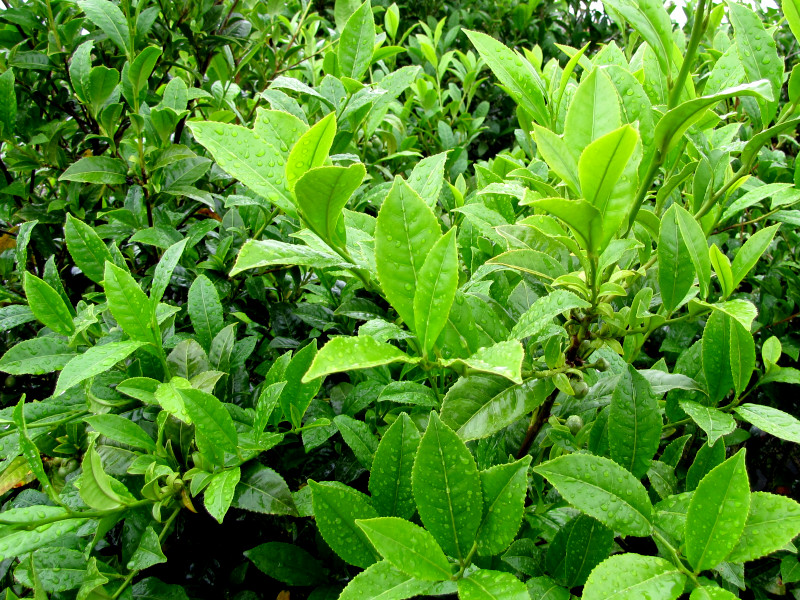Wise Mind Herbs
Evidence-based Herbal Healing
The information on this page has been prepared with reference to published scientific literature, not by a medically qualified expert. It is not medical advice. Any decision to use a supplement or herb-based product is your responsibility. Consult a suitably qualified medical professional, especially if you have underlying conditions. Remember, nothing is for everyone, and not everything sold is what it claims to be. Some things work for some people, some of the time.
Green tea - Camellia sinensis
Green tea (Camellia sinensis) has been extensively studied for its potential health benefits. It's important to distinguish it from other teas: black tea and oolong tea also come from Camellia sinensis but undergo different processing methods that affect their chemical composition. Herbal teas (like chamomile, peppermint, or rooibos) are not true teas as they don't come from Camellia sinensis and have different compounds and potential benefits.

Image source and license: https://commons.wikimedia.org/wiki/File:Starr-120620-7479-Camellia_sinensis-leaves-Kula_Agriculture_Station-Maui_(24850093120).jpg.
Modified by Peter Jorgensen.
Major Bioactive Compounds in Green Tea
The primary bioactive compounds in green tea are catechins (a type of polyphenol), particularly epigallocatechin-3-gallate (EGCG), which comprises approximately 50-80% of the total catechin content. Other important compounds include epicatechin (EC), epigallocatechin (EGC), epicatechin-3-gallate (ECG), caffeine, theanine, and various flavonoids.
Conditions Green Tea May Help Alleviate
It's crucial to note that green tea has not been proven to "cure" any condition. Research suggests it may help alleviate or reduce risk for:
- Cardiovascular disease: May help lower LDL cholesterol and blood pressure
- Type 2 diabetes: Potential improvements in insulin sensitivity
- Weight management: Modest effects on metabolism and fat oxidation
- Cognitive function: Possible neuroprotective effects against dementia and Alzheimer's
- Certain cancers: Preliminary evidence suggests potential protective effects against breast, prostate, colorectal, and other cancers
- Dental health: Antibacterial properties may reduce plaque formation and risk of caries
- Inflammatory skin conditions: Topical applications may help with acne and psoriasis
- Viral and bacterial infections: Some antimicrobial properties demonstrated in vitro
Recommended Dosages
Most studies reporting health benefits have used the following ranges:
- Green tea consumption: 3-5 cups daily (approximately 240-400 mg total catechins)
- EGCG content: 100-300 mg per day
- Green tea extract supplements: 250-500 mg daily, standardized to 45-80% EGCG
- L-theanine: 200-400 mg daily for cognitive and relaxation effects
Standardization varies significantly between products, making direct comparisons difficult. Many studies fail to adequately report standardization metrics.
Side Effects and Disbenefits
- Caffeine-related: Anxiety, insomnia, increased heart rate, digestive discomfort (green tea contains 25-45 mg caffeine per 8 oz cup)
- Potential iron absorption inhibition when consumed with meals
- Hepatotoxicity: Rare but documented cases with concentrated extracts, particularly at high doses or in fasting states
- Drug interactions: May affect metabolism of certain medications through effects on cytochrome P450 enzymes
- Pregnancy concerns: High doses not recommended due to caffeine content
- Tannin-related stomach upset in sensitive individuals
High-Dose Studies
Studies examining doses above 800 mg green tea catechins or 500 mg EGCG daily have reported varied findings. Some high-dose studies (800-1600 mg catechins) have shown enhanced weight loss effects and stronger antioxidant responses. However, several case reports and clinical trials have identified potential liver damage risks at these higher doses, especially in supplement form taken on an empty stomach. Knowledge gaps exist regarding long-term safety of high-dose supplementation and individual susceptibility factors for adverse effects.
Pharmaceutical Products with Green Tea Compounds
- Veregen® (sinecatechins): FDA-approved topical ointment containing green tea extract for treatment of genital and perianal warts
- Polyphenon E®: Standardized green tea extract used in clinical trials for various cancers
- TeGreen 97®: Standardized green tea extract used in various clinical studies
- Sunphenon®: Commercial standardized green tea extract used in research and some pharmaceutical applications
Most green tea products remain classified as dietary supplements rather than pharmaceuticals in most countries, thus avoiding rigorous regulatory standards required for approved drugs.
References
Azam, S., Hadi, N., Khan, N. U., & Hadi, S. M. (2003). Antioxidant and prooxidant properties of caffeine, theobromine and xanthine. Medical science monitor: international medical journal of experimental and clinical research, 9(9), BR325-30.
Chacko, S. M., Thambi, P. T., Kuttan, R., & Nishigaki, I. (2010). Beneficial effects of green tea: a literature review. Chinese medicine, 5, 1-9.
Hayat, K., Iqbal, H., Malik, U., Bilal, U., & Mushtaq, S. (2015). Tea and its consumption: benefits and risks. Critical reviews in food science and nutrition, 55(7), 939-954.
Isomura, T., Suzuki, S., Origasa, H., Hosono, A., Suzuki, M., Sawada, T., ... & Koga, T. (2016). Liver-related safety assessment of green tea extracts in humans: a systematic review of randomized controlled trials. European journal of clinical nutrition, 70(11), 1221-1229.
Mancini, E., Beglinger, C., Drewe, J., Zanchi, D., Lang, U. E., & Borgwardt, S. (2017). Green tea effects on cognition, mood and human brain function: A systematic review. Phytomedicine, 34, 26-37.
Wang, Y., Xia, H., Yu, J., Sui, J., Pan, D., Wang, S., ... & Sun, G. (2023). Effects of green tea catechin on the blood pressure and lipids in overweight and obese population-a meta-analysis. Heliyon, 9(11).
Xing, L., Zhang, H., Qi, R., Tsao, R., & Mine, Y. (2019). Recent advances in the understanding of the health benefits and molecular mechanisms associated with green tea polyphenols. Journal of agricultural and food chemistry, 67(4), 1029-1043.
Xu, R., Yang, K., Ding, J., & Chen, G. (2020). Effect of green tea supplementation on blood pressure: A systematic review and meta-analysis of randomized controlled trials. Medicine, 99(6), e19047.